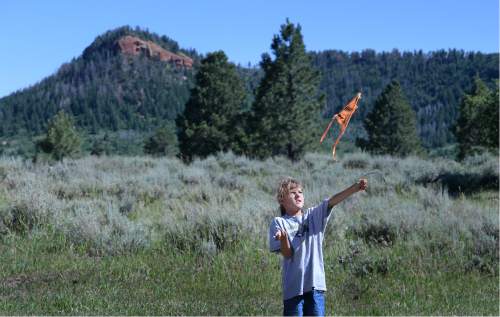This is an archived article that was published on sltrib.com in 2016, and information in the article may be outdated. It is provided only for personal research purposes and may not be reprinted.
Political gamesmanship over the Bears Ears reached its apex this week as Utah congressmen finally introduced their Public Lands Initiative bill while the manager of those lands, Interior Secretary Sally Jewell, trekked across the Utah red rock.
For Rep. Rob Bishop, the bill's introduction is culmination of an effort begun more than three years ago and represents thousands of hours of work from diverse interests. If passed, it would settle large and small disputes over public lands from Flaming Gorge to Lake Powell. It would add thousands of wilderness acres, expand one national monument (Dinosaur) and create another in Emery County.
But it wouldn't create a monument in San Juan County, and that is what's behind Jewell's high-profile journey through southeastern Utah. Indian tribes and environmentalists have coalesced around the idea of a national monument in the sacred lands surrounding the Bears Ears that would give Native Americans a unique management role to preserve both the heritage of their past and their traditions still practiced.
With Bishop and Rep. Jason Chaffetz unwilling to go there — in large part because their PLI process was driven by county commissioners in San Juan and elsewhere — the Indians have turned to President Obama to declare the monument under the Antiquities Act.
For their part, Bishop and Chaffetz made concessions since their draft PLI bill came out earlier this year. They added a large chunk to a conservation area around the Bears Ears, but they left vague what would be allowed in the area, including energy development. It grants an Indian role in management of part of the area, but not enough to satisfy the tribes. The Indian groups had earlier said they were stonewalled by the PLI process and walked away.
A key difference this time is removing a requirement that no current or future president could declare a monument in eastern Utah. That provision was considered sacrosanct by the congressmen when their draft came out. That has helped keep the White House talking, but the other changes haven't been enough to bring the tribes back.
Jewell was standing at the Dead Horse Point overlook Thursday when she turned to Fred Ferguson, Chaffetz' chief of staff, to comment about tribal representatives walking away from PLI talks. "They were probably frustrated by their last experience, Fred, so there's definitely some bridge building you're going to have to do."
The reality is that the PLI has problems that go beyond the Bears Ears. In too many places it bent toward the energy industry, and it would allow the counties to claim roads where there aren't any and shouldn't be. The PLI's county-driven process never accepted that it was about America's land, and so it never gave adequate voice to the tribes or to national environmental groups. That cost the congressmen years that could have gone into real talks.
Instead, we get a mad scramble at the end, and the Utahns in Congress look like they have been outplayed. A negotiated settlement would have been better, but a Bears Ears monument declaration looks like the only viable solution at this point.



